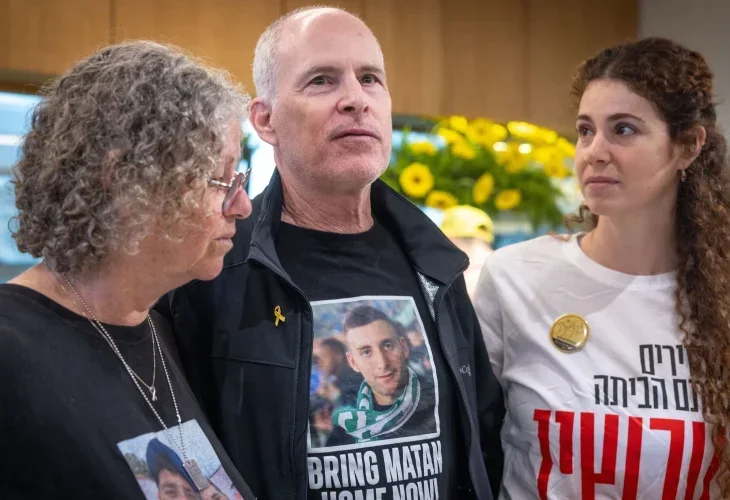Israel News
Israel Presents Hostage Testimonies Before UN Torture Panel
Former Gaza hostages Aviva and Keith Siegel recount months of abuse in Hamas captivity as Israel urges the UN to confront atrocities
 Aviva and Kieth Siegal (Miriam Alster, Flash90)
Aviva and Kieth Siegal (Miriam Alster, Flash90)
Israel’s delegation appeared before the UN Committee Against Torture (CAT) in Geneva on Wednesday, presenting detailed testimony from former Gaza hostages Aviva and Keith Siegel alongside a forceful appeal by Justice Ministry Director General Itamar Donenfeld for the UN to confront the scale of Hamas abuses.
The appearance marked Israel’s periodic review under the Convention Against Torture. This year, the session unfolded against the backdrop of the October 7 massacre and the testimonies of Israelis who survived prolonged captivity.
Donenfeld opened the session by stressing Israel’s commitment to the Convention and warning the committee against political distortions. “The testimonies we heard here today aren't just personal stories – they're a moral and legal indictment against the world's silence,” he said. He urged the panel to keep its findings “objective, fact-based, and free from any political bias.”
Keith Siegel, abducted from Kibbutz Kfar Aza, described being relocated 33 times during his months in Gaza. “I was held in tunnels, in schools, and residential homes with children and with wives of terrorists,” he testified. Siegel said he spent roughly six months in total isolation, enduring constant threats and humiliation. “At 66, cut off from the world, terrified, not knowing what happened to my loved ones,” he told the committee. Guards, he said, “would compare our body parts with another captive's, threaten us with knives, humiliate us, prevent us from using the bathroom until we couldn't hold it anymore.”
He recalled being starved, denied water, and forced to strip. “Every basic human right was stripped from me,” he said. Siegel added that his mother died before learning he had survived. “My mother did not get a chance to know that I was home, and I did not get a chance to say goodbye to her.” He urged the committee “to ensure the horrors the terrorists committed against me and others in captivity never happen again.”
Aviva Siegel described the violence she witnessed from the moment the couple was forced into Gaza. “The Hamas terrorists bound [a child’s] hands with plastic cuffs. He was covered in blood, we were covered in blood… I wanted to scream, and I saw the terrorist smiling while doing it.” She said she lived for 51 days certain she would die. “They threatened me, starved me… I lost 10 kilograms in 51 days.”
She recounted sexual abuse committed against female captives, including young women taken to showers and assaulted. “One of the terrorists touched her entire body and did whatever he wanted with her,” she said. Another girl, 16 years old, was forced to shower in front of a terrorist who “stood there, looked at her, and smiled.”
Aviva described being forbidden from comforting tortured captives, forced to lie unmoving for hours, and given contaminated water. “I had diarrhea for most of the time… I am 62 years old, I had to ask for permission to go to the bathroom.” She was also forced to pray to Allah. “I remember thinking to myself, to which Allah are they praying to?”
Donenfeld told the committee that rising antisemitism has allowed “ancient slanders and modern blood libels” to spread, adding, “These lies echo in the streets, across campuses, and even in the United Nations.” He asked CAT members to condemn Hamas atrocities and demand the return of all remaining hostages.
The Israeli delegation included senior officials from the Justice Ministry, Foreign Ministry, National Security Council, Israel Police, Prison Service, Population and Immigration Authority, and the Military Advocate General’s office. The review forms part of Israel’s obligations under the Convention, which requires periodic reporting and hearings every four years.

